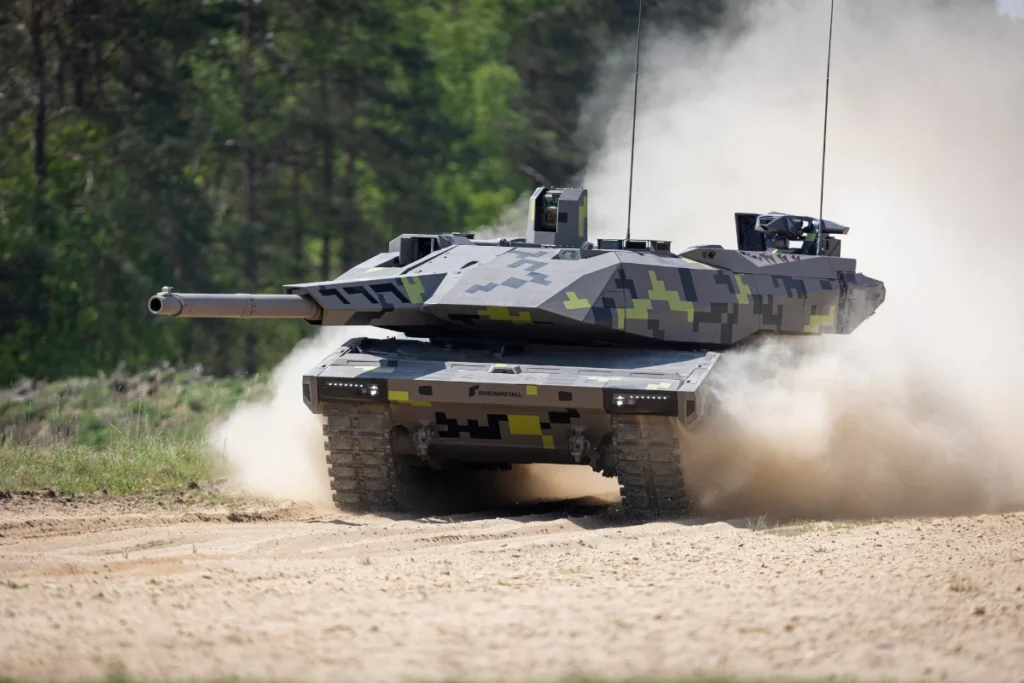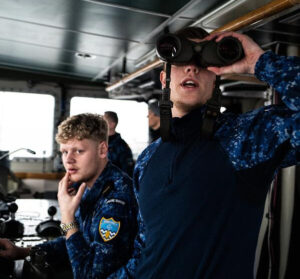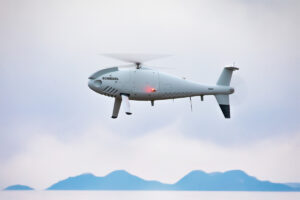
New at Eurosatory 2022 – embargoed until 13 June 2022 02.30 PM CEST
Rheinmetall is debuting its new KF51 Panther at Eurosatory 2022. The latest member of Rheinmetall‘s family of tracked vehicles (KF is short for « Kettenfahrzeug », i.e., tracked vehicle), the KF51 Panther is destined to be game changer on the battlefields of the future. The main battle tank concept sets new
standards in all areas – lethality, protection, reconnaissance, networking and mobility. Rheinmetall will be unveiling the vehicle at a ceremony on Monday, 13 June 2022 at 14:00 at Stand F241-240.
All weapon systems are connected to the commander’s and gunner’s optics and the fire control computer via the fully digitalised NGVA (NATO Generic Vehicle Architecture) architecture. This enables both a hunter-killer and a killer-killer function and thus instantaneous target engagement – in the future also supported by artificial intelligence (AI).
Lethality: With its main armament, the 130mm Rheinmetall Future Gun System, the KF51 Panther offers superior firepower against all current and foreseeable mechanised targets. In addition, further armament options are available to provide concentrated firepower for long-range strikes and against multiple targets. The Rheinmetall Future Gun System (FGS) consists of a 130 mm smoothbore gun and a fully automatic ammunition handling system. The autoloader holds 20 ready rounds.
Compared to current 120 mm systems, the FGS delivers over fifty percent greater effectiveness at significantly longer ranges of engagement. The FGS can fire kinetic energy (KE) rounds as well as programmable airburst ammunition and corresponding practice rounds.
A 12.7 mm coaxial machine gun complements the main weapon. Several options for the integration of remotely controlled weapon stations (RCWS) offer flexibility for proximity and drone defence. The KF51 Panther presented at Eurosatory 2022 is equipped with Rheinmetall‘s new « Natter » (adder) RCWS in the 7.62 variant. Integrating a launcher for HERO 120 loitering munition from Rheinmetall‘s partner, UVision into the turret is equally possible.
This enhances the KF51’s ability to strike targets beyond the direct line of sight.
Survivability and force protection: The Panther has a fully integrated, comprehensive, weight-optimized
protection concept, incorporating active, reactive and passive protection technologies. Without a doubt, the concept’s most compelling feature is its active protection against Kinetic Energy (KE) threats. It increases the level of protection without compromising the weight of the system.
Rheinmetall‘s Top Attack Protection System (TAPS) wards off threats from above, while the fast-acting
ROSY smoke/obscurant systems conceals the KF51 from enemy observation. Moreover, its digital NGVA architecture enables integration of additional sensors for detecting launch signatures.
Thanks to its pre-shot detection capability, the KF51 Panther can recognize and neutralize threats at an early stage.
Designed to operate in a contested electromagnetic environment, the KF51 is fully hardened against
cyber threats.
Controllability and networking: The KF51 Panther features an innovative operating concept. It is basically
designed for a three-person crew: the commander and gunner in the turret and the driver in the chassis,
where an additional operator station is available for a weapons and subsystems specialist or for command personnel such as the company commander or battalion commander.
Designed in accordance with NGVA standards, the tank’s fully digital architecture enables seamless
integration of sensors and effectors both within the platform as well as into a networked « system of
systems ». Operation of sensors and weapons can be transferred instantly between crew members. Each
operator station can take over the tasks and roles from others, while retaining full functionality. Since the
turret and weapons can also be controlled from the operator stations in the chassis, variants of the KF51
Panther with unmanned turrets or completely remote-controlled vehicles are also planned in the future.
Reconnaissance and situational awareness: Thanks to the panoramic stabilized electro-optical sensor system (SEOSS) optical sensor and EMES main combat aiming device, the commander and gunner are both able to observe and engage targets independently of each other, both day and night, while a stabilized daylight and Infra Red (IR) optic with integrated laser rangefinder is available to both. In addition, via a display in the fighting compartment, the crew has a 360°, round-the-clock view of the vehicle’s surroundings. Integrated, unmanned aerial reconnaissance systems enhance the crew’s situational awareness in built-up areas and in the immediate vicinity of the vehicle. With these, the crew can also conduct reconnaissance under armour protection and share the results with other actors in a networked manner.
Mobility: The KF51 Panther builds on the mobility concept of the Leopard 2. With an operational weight
of just 59 tons, it delivers far greater mobility than current systems and has a maximum operating range
of around 500 kilometres. Without prior preparation, it fits into the AMovP-4L profile, something no other current main battle tank upgrade can do.
Consequently, the KF51‘s tactical and strategic mobility set it apart.
Logistics: Thanks to Rheinmetall‘s innovative development approach, users, maintenance specialists, logisticians and procurement experts from all current and future user nations can play an active role in
shaping the vehicle’s future. Rheinmetall has longstanding experience in establishing global supply chains in order, in cooperation with user nations, to make sure that a large share of production is carried out in-country, thus helping to create and/or preserve sovereign capabilities and capacities.
Future viability: In developing the KF51, Rheinmetall not only set out to modernize existing main battle
tank concepts. Starting from scratch, it completely reconceived the platform. The KF51 Panther can be
easily updated and equipped with the latest capabilities and functions. Its advanced, modular, open NGVA system architecture enables iterative development, which can then be updated in harmony with
innovation cycles. The KF51 is the first representative of a new generation of combat vehicles. Soon,
future innovations will enable environmentally friendly peacetime operations and further optimization
regarding automation and combat effectiveness.



